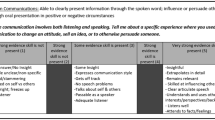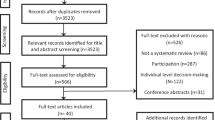Abstract
This paper describes the development and initial evaluation of a didactic curriculum to prepare research support staff with the core knowledge and skills required to collect patient-reported outcomes (PROs) via interviews. Research support staff members (N = 77) were recruited for eight separate workshops, each consisting of a didactic presentation followed by role-play scenarios with trained actors depicting common scenarios they may encounter as part of patient interaction. Trainees were observed and received feedback on their performance from trained facilitators and peers. In comparison to their pre-training assessment, trainees showed significant improvement in their confidence to conduct a research interview, handle a distressed participant, manage a wandering interview, ask participants sensitive questions, and handle irritated patients. Training research support staff in the effective collection of PROs via patient interviews can improve the confidence of these individuals in interacting with patients, which can ultimately lead to increased accuracy of data collection.
Similar content being viewed by others
Notes
The irritated patient scenario was not included in the first two training sessions.
The didactic presentation is available for use by request from the authors.
References
Basch E, Iasonos A, Barz A, Culkin A, Kris MG, Artz D et al (2007) Long-term toxicity monitoring via electronic patient-reported outcomes in patients receiving chemotherapy. J Clin Oncol 25:5374–5380
Basch E (2010) The missing voice of patients in drug-safety reporting. N Engl J Med 362:865–869
NCI (2001) National Cancer Institute. Cancer therapy evaluation program. NCI guidelines—expedited adverse event reporting requirements for NCI investigational agents. National Cancer Institute, Bethesda
Basch E, Jia X, Heller G, Barz A, Sit L, Fruscione M et al (2009) Adverse symptom event reporting by patients vs clinicians: relationships with clinical outcomes. J Natl Cancer Inst 101:1624–1632
US Food and Drug Administration. (2009) Guidance for industry. Patient-reported outcome measures: use in medical development to support labeling claims (December 2009). Available from: http://www.fda.gov/downloads/Drugs/GuidanceComplianceRegulatoryInformation/Guidances/UCM193282.pdf. Accessed 14 June 2012
Bruner DW, Hanisch LJ, Reeve BB, Trotti AM, Schrag D, Sit L et al (2011) Stakeholder perspectives on implementing the National Cancer Institute’s patient-reported outcomes version of the Common Terminology Criteria for Adverse Events (PRO-CTCAE). Behav Med Pract Policy Res 1:110–122
Basch E (2012) Beyond the FDA PRO Guidance: steps toward integrating meaningful patient-reported outcomes into regulatory trials and US drug labels. Value Health 15:401–403
Fairclough DL (2005) Practical considerations in outcomes assessment for clinical trials. In: Lipscomb J, Gotay CC, Snyder CF (eds) Outcomes assessment in cancer. Cambridge University Press, Cambridge, pp 346–361
Kobak KA, Greist JH, Jefferson KW, Katzelnick DJ (1996) Computer-administered rating scales: a review. Psychopharmacology 127:291–301
Fayers PM, Machin D (2007) Quality of life: the assessment, analysis and interpretation of patient reported outcomes. Wiley, West Sussex
Kobak KA, Feiger AD, Lipsitz JD (2005) Interview quality and signal detection in clinical trials. Am J Psychiatry 162:268
Willis GB (2005) Cognitive interviewing: a tool for improving questionnaire design. SAGE, Thousand Oaks
Groves RM, Couper MP (1998) Nonresponse in household interview surveys. Wiley, New York
Pessin H, Galietta M, Nelson CJ, Brescia R, Rosenfeld B, Breitbart W (2008) Burden and benefit of psychosocial research at the end of life. J Palliat Med 11:627–632
Shea S (1998) Psychiatric interviewing: the art of understanding, 2nd edn. Saunders, Philadelphia
Bylund CL, Brown RF, Bialer PA, Levin TT, Lubrano di Ciccone B, Kissane DW (2011) Developing and implementing an advanced communication training program in oncology at a comprehensive cancer center. J Cancer Educ 26:604–611
Funderburk AE (2008) Mentoring: the retention factor in the acute care setting. J Nurses Staff Dev 24:E1–E5
Acknowledgments
This project was supported by a National Institutes of Health Support Grant (P30-CA-008748) and a National Cancer Institute Career Award (K07 CA109236). We wish to acknowledge the efforts of Enid Zuckerman toward contributing to the didactic material on elderly patients, as well as the MSKCC research support staff that participated in the brief video demonstrations.
Conflict of Interest
There are no financial relationships associated with these results that may reflect a conflict of interest or be perceived to reflect a conflict of interest.
Author information
Authors and Affiliations
Corresponding author
Rights and permissions
About this article
Cite this article
Atkinson, T.M., Hurley, K., Bylund, C.L. et al. Development and Preliminary Evaluation of a Training Workshop for the Collection of Patient-Reported Outcome (PRO) Interview Data by Research Support Staff. J Canc Educ 28, 33–37 (2013). https://doi.org/10.1007/s13187-012-0427-z
Published:
Issue Date:
DOI: https://doi.org/10.1007/s13187-012-0427-z




